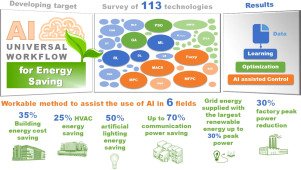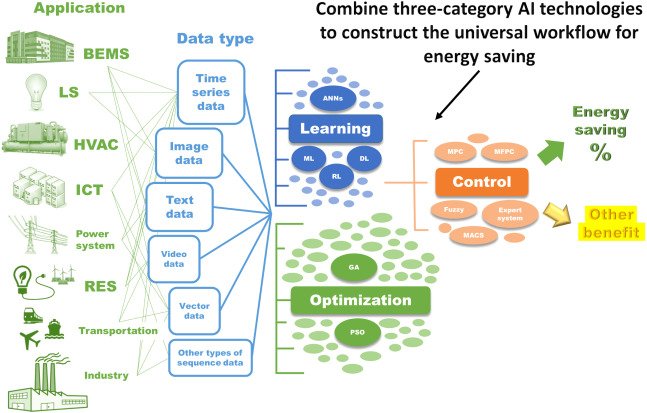
When it comes to managing energy in today’s world, finding cost-saving solutions is always a top priority. That’s where the potential of artificial intelligence (AI) comes into play. AI has emerged as a game-changer in energy management, offering innovative ways to optimize energy usage and reduce costs. In this article, we will explore the exciting possibilities that AI brings to the table and how it can revolutionize energy management for maximum savings.
AI, with its ability to analyze massive amounts of data and make intelligent decisions, has the potential to transform energy management practices. By leveraging AI algorithms and machine learning, businesses can gain valuable insights into their energy consumption patterns, identify areas of inefficiency, and implement targeted strategies to minimize waste. This not only helps in reducing energy costs but also contributes to a greener and more sustainable future.
With AI-powered energy management systems, businesses can automatically monitor and control various energy-consuming devices and systems in real-time. From HVAC systems to lighting and beyond, AI can optimize the usage of these resources based on factors such as occupancy, weather conditions, and energy demand. By dynamically adjusting energy consumption, businesses can minimize waste and achieve significant cost savings without compromising on comfort or operational efficiency.
In conclusion, the potential of AI in energy management for cost savings is immense. By harnessing the power of AI algorithms and machine learning, businesses can optimize their energy usage, reduce costs, and contribute to a more sustainable future. The era of smart energy management has arrived, and AI is leading the way towards a brighter and more efficient tomorrow.
The potential of AI in energy management is immense, especially when it comes to cost savings. By utilizing artificial intelligence algorithms, businesses can optimize their energy consumption, identify areas of inefficiency, and make data-driven decisions to reduce energy waste. AI-powered systems can analyze vast amounts of data in real-time, detect patterns, and suggest energy-saving measures. This not only helps companies save money on their energy bills but also contributes to a more sustainable and environmentally friendly approach to energy management.

The Potential of AI in Energy Management for Cost Savings
Artificial intelligence (AI) has revolutionized various industries, and energy management is no exception. With its ability to analyze large amounts of data and make intelligent decisions, AI is transforming the way energy is managed, leading to significant cost savings. In this article, we will explore the potential of AI in energy management and how it can help businesses optimize their energy usage while reducing expenses.
The Role of AI in Energy Management
AI has the capability to collect, process, and analyze vast amounts of data from various sources, including smart meters, sensors, and weather forecasts. By leveraging machine learning algorithms, AI systems can identify patterns, anomalies, and trends in energy consumption, enabling businesses to gain valuable insights into their energy usage.
One of the key benefits of AI in energy management is its ability to optimize energy consumption based on real-time data. AI algorithms can continuously monitor energy usage patterns and make adjustments to ensure the most efficient use of resources. For example, AI can automatically adjust lighting and temperature settings in a building based on occupancy and external conditions, reducing energy waste and lowering costs.
Improved Energy Efficiency
AI-powered energy management systems can identify areas of inefficiency and propose solutions to improve energy efficiency. By analyzing data from various sources, such as energy consumption patterns, equipment performance, and building occupancy, AI can identify areas where energy is being wasted and recommend strategies to optimize energy usage.
Furthermore, AI can predict energy demand and adjust energy generation accordingly. For example, in a renewable energy system, AI algorithms can analyze weather forecasts and predict when solar or wind power generation will be optimal. This allows businesses to align energy generation with demand, reducing reliance on grid power and saving on electricity costs.
Optimal Resource Allocation
AI can also help businesses optimize resource allocation by analyzing data on energy consumption and costs. By identifying patterns and correlations, AI systems can recommend the best allocation of resources to minimize costs while maintaining operational efficiency.
For example, AI can analyze historical data on energy usage and production costs to determine the optimal scheduling of equipment maintenance. By scheduling maintenance during periods of low energy demand, businesses can avoid costly downtime while minimizing the impact on operations.
The Benefits of AI in Energy Management
Implementing AI in energy management offers several benefits for businesses seeking to reduce costs and improve sustainability. Here are some key advantages:
Cost Savings
AI-powered energy management systems can significantly reduce energy costs by optimizing energy usage and identifying areas of inefficiency. By automating energy demand response and adjusting energy consumption based on real-time data, businesses can avoid peak demand charges and reduce overall energy consumption, leading to substantial cost savings.
Sustainability
AI can play a crucial role in promoting sustainability by optimizing energy usage and reducing carbon emissions. By analyzing data on energy consumption, AI systems can identify opportunities for energy conservation and recommend energy-efficient practices. This not only helps businesses reduce their environmental footprint but also enhances their reputation as responsible corporate citizens.

Operational Efficiency
AI-powered energy management systems can improve operational efficiency by automating energy-related tasks and optimizing resource allocation. By analyzing data on equipment performance and energy consumption, AI can identify areas for improvement and recommend strategies to enhance operational efficiency. This can result in reduced downtime, improved productivity, and overall cost savings.
Challenges and Considerations
While the potential of AI in energy management is vast, there are certain challenges and considerations that businesses need to be aware of. These include:
Data Security
AI systems rely on vast amounts of data, including sensitive information about energy usage and operational processes. It is crucial for businesses to have robust data security measures in place to protect this information from unauthorized access or cyber threats.
Integration with Existing Systems
Integrating AI-powered energy management systems with existing infrastructure and systems can be complex. Businesses need to ensure compatibility and seamless integration to maximize the benefits of AI while minimizing disruptions to operations.
Training and Expertise
AI systems require training and expertise to ensure accurate data analysis and optimal performance. Businesses may need to invest in training programs or collaborate with AI experts to effectively implement and manage AI-powered energy management systems.
In conclusion, AI has immense potential in energy management for cost savings. By leveraging AI’s ability to analyze data, optimize resource allocation, and improve energy efficiency, businesses can reduce energy costs, enhance sustainability, and improve operational efficiency. However, businesses must also address challenges such as data security and system integration to fully harness the benefits of AI in energy management. With the right strategies and investments, AI can revolutionize energy management and drive significant cost savings for businesses.
The Potential of AI in Energy Management for Cost Savings
- AI technology can help businesses optimize energy usage, leading to significant cost savings.
- By analyzing data, AI algorithms can identify energy inefficiencies and recommend improvements.
- Automated energy management systems powered by AI can adjust energy usage in real-time based on demand.
- AI can predict energy consumption patterns and suggest strategies to reduce peak demand charges.
- Using AI to optimize energy management can contribute to a more sustainable future by reducing carbon emissions.
Frequently Asked Questions

How can AI be utilized in energy management to achieve cost savings?
Artificial Intelligence (AI) has immense potential in energy management to optimize costs and achieve savings. By leveraging AI algorithms and machine learning, energy management systems can analyze real-time data from various sources such as sensors, smart meters, and weather forecasts to identify energy consumption patterns and make intelligent decisions.
With AI, energy management systems can automatically adjust and optimize energy usage based on factors such as demand, pricing, and available renewable energy sources. This allows businesses and households to minimize energy wastage, reduce peak loads, and take advantage of lower-cost energy options, ultimately leading to substantial cost savings.
What are the key benefits of using AI in energy management for cost savings?
Using AI in energy management offers several significant benefits for cost savings. Firstly, AI-powered systems can provide real-time insights into energy consumption patterns, allowing businesses to identify areas of inefficiency and implement targeted energy-saving measures.
Additionally, AI algorithms can analyze historical data and predict future energy consumption, enabling businesses to optimize their energy procurement strategies and take advantage of more favorable pricing options. This proactive approach helps reduce energy costs and avoid unnecessary expenses.
Can AI help in identifying energy-saving opportunities in complex industrial processes?
Yes, AI can play a crucial role in identifying energy-saving opportunities in complex industrial processes. By analyzing vast amounts of data from various sensors and devices, AI algorithms can detect patterns and anomalies that may indicate energy inefficiencies.
Furthermore, AI can simulate different scenarios and recommend energy-saving strategies in real-time. For example, in manufacturing plants, AI can optimize production schedules, adjust equipment settings, and even predict maintenance needs to minimize energy consumption and associated costs.
How can AI assist in optimizing energy usage for renewable sources?
AI can greatly enhance the optimization of energy usage for renewable sources. By integrating AI algorithms with renewable energy generation systems, such as solar panels or wind turbines, AI can forecast renewable energy production based on weather conditions and adjust energy consumption accordingly.
Moreover, AI can analyze historical data and identify patterns that maximize the utilization of renewable energy sources. This includes determining the optimal time to charge energy storage systems or redirect excess energy to other areas, reducing reliance on conventional energy sources and achieving significant cost savings.
What challenges are associated with implementing AI in energy management for cost savings?
While the potential of AI in energy management is promising, there are some challenges to consider. One challenge is the availability and quality of data. AI systems heavily rely on accurate and extensive data to make informed decisions. Therefore, ensuring data integrity and accessibility is crucial for the successful implementation of AI in energy management.
Another challenge is the initial investment required to deploy AI systems. While the long-term cost savings can be significant, the upfront costs associated with installing sensors, meters, and AI infrastructure may deter some businesses from adopting AI-based energy management solutions.

Final Summary: Harnessing the Power of AI for Energy Management
As we conclude our exploration of the potential of AI in energy management for cost savings, it’s clear that this technology holds tremendous promise for revolutionizing the way we optimize energy consumption. By leveraging advanced algorithms and machine learning capabilities, AI systems can analyze vast amounts of data, identify patterns, and make intelligent predictions to enhance energy efficiency and drive down costs. The applications of AI in energy management are vast, ranging from smart grid optimization to predictive maintenance and demand response.
By integrating AI into energy management practices, businesses and organizations can unlock significant cost savings, reduce environmental impact, and enhance overall operational efficiency. The ability of AI systems to continuously learn and adapt to changing conditions ensures ongoing optimization and improvement in energy management practices. With the potential to automate tasks, deliver real-time insights, and enable proactive decision-making, AI empowers energy managers to make data-driven choices and maximize energy savings.
In conclusion, the integration of AI in energy management represents an exciting frontier that promises to transform the way we consume and manage energy. By harnessing the power of AI, we can achieve substantial cost savings, improve sustainability, and pave the way for a more efficient and greener future.